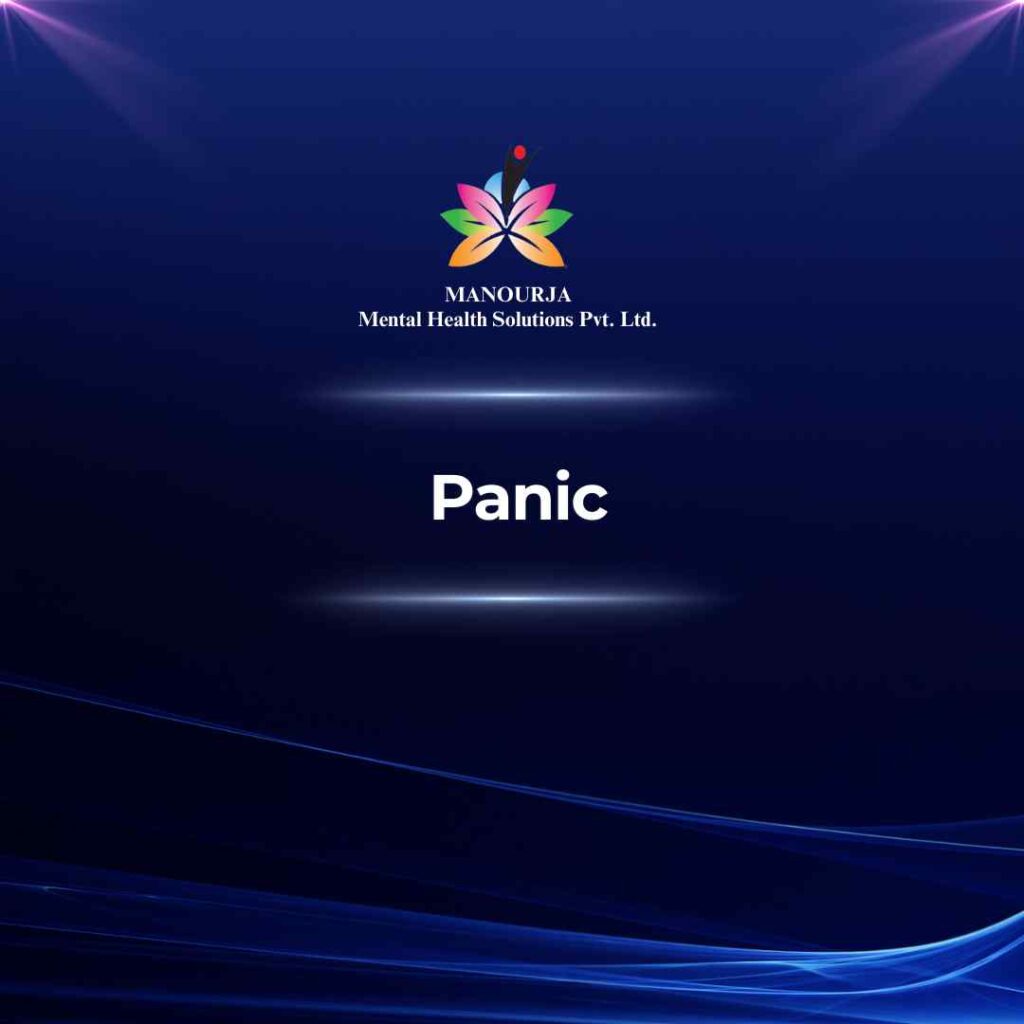Panic

“Panic” is an overwhelming and intense feeling of anxiety or fear that arises suddenly and unexpectedly. It is characterized by a sense of impending doom, extreme discomfort, and a strong urge to escape or find safety. Panic can be accompanied by physical symptoms such as rapid heartbeat, sweating, trembling, shortness of breath, chest pain, dizziness, and feelings of unreality or detachment from oneself.
Panic as a Sign and Symptom of Mental Illness
Panic can occur as a symptom of several mental health disorders, particularly anxiety disorders. It represents a heightened state of fear response that is disproportionate to any actual threat or danger present. Panic attacks, which are acute episodes of intense panic, are a hallmark feature of certain conditions.
Mental Illnesses with Panic as Symptoms
Panic can be a feature of several mental health disorders, including:
- Panic Disorder: This disorder is characterized by regular and unexpected panic attacks. Individuals with panic disorder often worry about having future panic attacks and may avoid situations or places where panic attacks have occurred previously.
- Generalized Anxiety Disorder (GAD): While generalized anxiety is characterized by persistent worry and anxiety about various aspects of life, panic attacks can occur in individuals with GAD during periods of heightened stress or perceived threat.
- Post-Traumatic Stress Disorder (PTSD): Panic attacks can occur as part of the symptomatology of PTSD, particularly during triggers or reminders of traumatic events.
- Social Anxiety Disorder (Social Phobia): In social anxiety disorder, individuals may experience panic attacks in social situations where they fear embarrassment or negative evaluation by others.
- Specific Phobias: Panic attacks can be triggered by specific phobias, such as fear of flying (aviophobia), fear of heights (acrophobia), or fear of enclosed spaces (claustrophobia).
- Agoraphobia: This anxiety disorder involves fear and avoidance of situations or places where escape might be difficult or help unavailable in the event of a panic attack. Panic attacks are common in agoraphobia.
- Substance Use Disorders: Intoxication or withdrawal from certain substances, such as stimulants or alcohol, can trigger panic attacks.
Managing and Treating Panic
Treatment for panic and panic attacks focuses on reducing the frequency and severity of episodes, managing symptoms, and improving overall quality of life:
- Cognitive-Behavioral Therapy (CBT): CBT techniques, including exposure therapy and cognitive restructuring, can help individuals identify and change negative thought patterns and reduce avoidance behaviors.
- Medication: Antidepressants, particularly selective serotonin reuptake inhibitors (SSRIs) and benzodiazepines, may be prescribed to reduce symptoms and prevent panic attacks.
- Relaxation Techniques: Learning and practicing relaxation techniques such as deep breathing, progressive muscle relaxation, and mindfulness meditation can help manage anxiety and reduce the intensity of panic attacks.
- Supportive Therapies: Support groups, peer support, and psychoeducation about panic disorder and anxiety can provide validation, coping strategies, and emotional support.
Recognizing panic as a symptom of underlying mental health conditions is crucial for accurate diagnosis and effective treatment. Addressing panic attacks through comprehensive and individualized treatment approaches can help individuals regain control over their lives and improve their overall well-being.
At MANOURJA, we believe in the transformative power of counseling. Our experienced therapists offer a safe and supportive space where you can explore your thoughts, emotions, and challenges. Through personalized counselling sessions, we’ll work together to develop coping strategies, build resilience, and achieve lasting positive change. Discover the path to a healthier, happier you with MANOURJA counselling services.
MANOURJA Rehabilitation Services
At MANOURJA, we’re dedicated to helping you in rebuild your life, after difficult times. Our rehabilitation services focus on understanding what you need to move forward, whether you’re recovering from addiction, trauma, or any psychological – social challenges. We create personalized plans, that are all about helping you, regain your strength and find hope again. With a caring team by your side, you’ll have the support to make real progress and take steps toward a brighter, healthier future.
